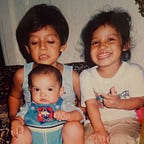Exodus
I was nine when the world went underwater, not five like Lou — first published in Defunkt Magazine.
Exodus
“We don’t use Exodus anymore,” I say as I close the book and hand it back to Lou.
She crossed her arms and said to keep it, that it might help with my report.
I keep my mouth shut and leave her on the steps of the library. “Exodus was once a grand subterranean machine dedicated to the extraction of large materials hidden underwater.” I close the book again.
I knew all about Exodus. I was nine when the world went underwater, not five like Lou. Every building became a high-rise and Mother finally became wealthy, outfitting them with elaborate elevators and taking me to see the views from her glass office. It became a national holiday, not because of Exodus, but because we all became pseudo mermaids.
I thumb the book open and turn to the ending. “Although outdated, Exodus is still used and preferred today by several small companies across the globe.”
I don’t use my legs much to walk anymore, just to visit Outer Edge, this little town with one library. Lou’s family lives above the library in a handful of rooms they converted into studios. They’re part of a community which chose to stay on or live near little pockets of land that refused to sink when the world went underwater, even while the rest of us built conglomerates up to 30,000 leagues under the sea. Mother would always ask why I chose to visit a stone-age building, stuck in an old town, dead set on living in an ancient time. I never answer her because I know she never expects an answer.
I can see the ocean’s edge. Whenever I do visit Lou, she fills my ears with gossip she hears between the library’s customers. The same customers who never check out books, but Lou’s parents don’t mind; they just sit behind the counter and listen to their stories and share many of them themselves. The visitors often ask if they were ever famous authors or teachers and sometimes Lou’s parents will oblige and nod their heads vigorously and knuckle their glasses firmly up their nose while smiling, but they were actually janitors for a nearby school which crumbled during the massive earthquakes. The library remained fairly untouched. It stands like a humble sentinel — teeming with cracks in the foundation, water running through the channels — accepting it’s position in life.
I make it to the water’s edge, where a bridge begins, but most of it submerged. I turn back and see in the distance a Lou-sized black blip sitting on cement steps. Her shadow stretches toward me like the point of Poseidon’s staff. She waves enthusiastically. I turn back toward the water and reach into my pocket for the poxies — little red pills that can run you as much as an apartment above a library. I swallow them and wait a minute. I’m about to submerge myself but remember the book in my hand. The pages would get ruined, the whole Exodus. I suddenly fear if Lou is still watching, if she notices my indecision. She should’ve just kept the book. Or scanned the images into an email. Except, except Exodus seems too important to fit in an email. The cover is striking. Navy colored in a heavy-weight canvas with cream-colored etching and gold trim along the border. I run my hand across the title, across the nicks in the corners, and the wrinkles in the spine. I almost look over my shoulder again.
A boy to my right rushes into the water, sending droplets everywhere. I look back at Exodus and watch as water droplets sink into the title. I remove most of them. I press into the last droplet with my thumb and hold my thumb there, afraid to check under it. I scowl at the boy, his image blurry as he swims down deeper to reach a lamppost. Mother would be upset. I know it. She’ll wonder why I didn’t just swim home. I curl the book into my forearm and reach with my right to call her. She responds quickly. I can definitely feel someone’s stare now — at my back, at my forearm. I pocket my call device and wait for Mother. I keep my thumb on the title the entire time, even as Mother arrives and lets me in and makes idle talk.
“What’s that in your arm?”
I stiffen. “A book.”
“A book?”
“Exodus.” I turn away from her. “I need it for a report.”
Mother doesn’t say another word as she prepares to take off.
I let out a breath against the window; the fog left behind disappears. I stare at Lou’s black blur from the passenger seat even when it becomes indecipherable; even when it’s completely gone.
